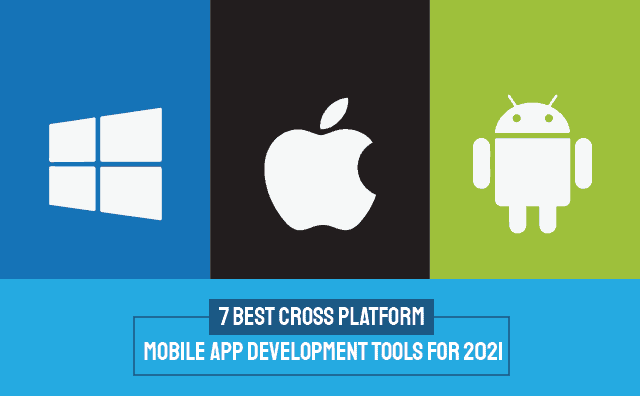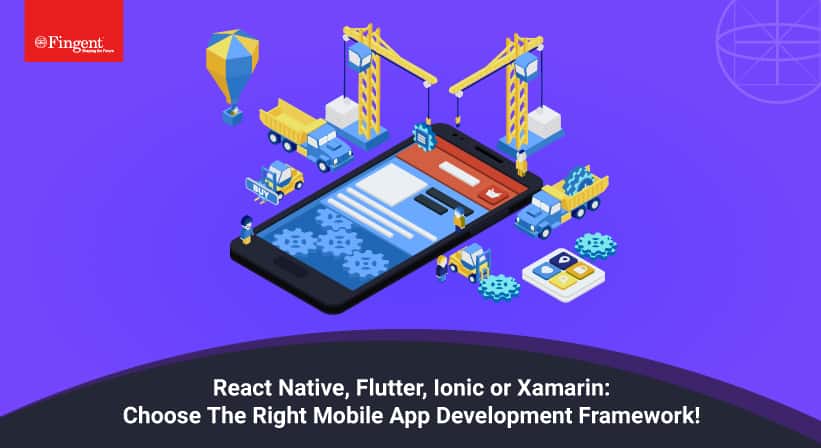Top Technologies Used to Develop Mobile App
Leading Mobile App Development Frameworks in 2021
The COVID-19 forced social distancing and lockdown policies are driving a steady rise in mobile usage. In Q3 of 2020 alone, 33 billion new apps were downloaded globally, according to a recent report. Mobile users worldwide have spent 180 billion collective hours each month of the third quarter, with a whopping spend of $28 billion on technology apps. Undoubtedly, the pandemic would have a lasting impact on mobile app development trends and technologies going forward, just like how it transformed the consumer mobile behavior.
It is true that a well engaging and standout business app will enhance branding and retain customers. Every business that wants to sell its products, extend assistance, offer service, or share information will definitely strive to make its mobile app user-friendly and accessible to customers. Besides identifying how your mobile application will function or what resources you’ll require, it’s important to figure out which mobile development platforms or technology in mobiles will serve your needs better.
Watch Video: How to choose the right mobile app development approach
Let it be Android mobile apps development, iOS, hybrid, or cross-platform, you need to familiarize yourself with the mobile development application tech in vogue.
Five major programming languages used to develop mobile apps today
The five major programming languages that are largely used for mobile app development include:
1. Swift
If you are building something specific to Apple OS (native to Apple), Swift is the language to seek. Swift is a popular iOS application development language that offers advanced features with minimal coding that can be easily maintained. Swift is a powerful and intuitive language loved by Apple developers who use it for macOS, iOS, watchOS, tvOS, and so on.
2. C++
C++ forms the simplistic base for most of the programming languages and possesses the power to create dynamic technology apps. C++ is highly sought after today to develop multi-platform apps. You can write code in C++ to develop the application once and use it on different platforms (Android, iOS, and Windows) without sacrificing the app’s performance or security. The simple and effective compiler-based approach makes it a versatile tool that can be used for multiple platforms. Its sister language, Objective-C, was earlier used for app development in Apple systems, prior to the introduction of Swift in 2014.
3. Java
Since the introduction of Android in 2008, this object-oriented programming language has been the popular and official language for Android mobile app development. An extremely versatile language, Java helps keep your app flexible, modular, and extensible. Java is easy to handle and many open source libraries are made available for users to choose from.
4. HTML5
There is no better technology to use than HTML5 if your organization is looking at developing web-frontend applications for mobile devices. Organizations that consider cross-platform mobile app development as a daunting task often resort to HTML5 as it helps you deliver the right functionality and exceptional user experience. The “write-once-run-anywhere” advantage offered by HTML5 accelerates your time to market, improves your app’s visibility, makes development affordable, and supports offline browsing.
5. PHP
A rather easy language to learn, PHP is object-oriented and uses a three-layered model to help create dynamic mobile apps and web applications. It is highly suitable for apps that require database integration. Popular PHP frameworks such as Laravel, Lumen, CodeIgniter, and Symfony are being used extensively for building mobile apps that require complex backend and exhaustive data migration. Large scale app projects prefer this open-source language a lot as it simplifies caching, authentication, and even routing.
A host of advanced technology tools are available for those who are looking forward to creating their own mobile apps using these programming languages. These developer tools are perfect for building mobile apps from scratch and even offer multi-platform capabilities for reaching larger audiences.
Read more: How to Empower your Business with an iOS Application
Top tools that can help you get started with building your own mobile app
1. PhoneGap
PhoneGap, also known as Apache Cordova, is an open-source mobile app development framework that uses CSS3, HTML5, and JavaScript, to create native applications for Android, Windows, and iOS. This framework allows mixing native and hybrid code snippets which results in apps that are neither truly native mobile nor web-based applications.
2. Appcelerator
This open-source framework is the best choice to develop hardware-based apps. The framework uses HTML, PHP, and JavaScript to create native apps for iOS, Android, and Windows UWP.
3. RhoMobile
RhoMobile Suite is based on the powerful Rhodes open-source framework that supports native app development for multiple platforms. It’s highly used to build cross platform and native consumer and enterprise mobile applications. RhoMobile uses web technologies like CSS3, HTML5, JavaScript, and Ruby to build apps for most of the operating systems including iOS, Android, and Windows.
4. WidgetPad
WidgetPad is one of the best open-source frameworks for cross platform mobile application development. It uses web technologies like JavaScript and HTML5 to offer a multitude of options like source code editing, versioning, and distribution. This open-source framework enables developing applications for platforms like Android, iOS, and web.
5. MoSync
MoSync is an open-source multi-platform mobile app development kit that utilizes programming languages such as JavaScript, PHP, Ruby, and Python. It is integrated with Eclipse-based IDE and enables native mobile app development for multiple platforms using C/ C++ programming.
Case Study: Explore how a Video Making Mobile App developed by Fingent transformed our customer’s experience. Click here to download the case study!
Leading mobile application development frameworks that developers need to explore in 2021

1. Flutter
Flutter is the new trending cross-platform mobile application development technology in town. It uses “Dart” as a programming language instead of JavaScript which facilitates rapid and effective analysis, fabricates UIs, includes highlights and fixes bugs in milliseconds. The open source cross-platform SDK by Google extends a wide range of plugins backed by Google and allows mobile apps to be built for both Android and Apple iOS platforms.
2. React Native
This JavaScript open-source framework has become the most preferred native mobile app development technology. It offers ample support to IDEs and other mobile app development tools and enables the development of native apps for iOS and Android platforms. ReactNative framework allows to build native mobile apps with JavaScript, using the same design as React. Apps built using React Native are real mobile apps, that cannot be distinguished from an app built using Objective-C or Java or Swift.
3. Ionic
Ionic uses the HTML5 programming language and is widely preferred for mobile app development today. It combines HTML, CSS3, and JavaScript to build native apps and create their UI functionalities with ease. This mobile app development technology works on iOS’s UIWebView or Android’s WebView. Ionic is built on top of Angular JS and Apache Cordova. Ionic is the easiest way for web developers to build, grow, and scale cross-platform mobile apps.
4. Xamarin
This cross-platform framework with coding advantages of C# uses single code across iOS, Android, Windows, and other platforms. With the benefits of code sharing, Xamarin builds applications that render exact native app experience. It is the most time and cost saving framework for mobile app development. Xamarin allows you to deliver native Android, iOS, and Windows apps with a single shared .NET code base. The framework offers access to the full spectrum of functionality exposed by the underlying platform and device, including platform-specific capabilities.
Get your FREE mobile app specification template here!
5. NativeScript
Originally developed by Progress (Telerik by Progress), NativeScript is one of the most desired open source frameworks to develop Apple iOS and Android apps today. NativeScript allows developers to build mobile apps using JavaScript or by any other language that trans-compiles to JavaScript (eg: TypeScript). Native API reflection, Angular integration, and Vue.js integration are some of the notable features of NativeScript. The framework also allows developers to re-purpose third-party libraries from Maven, npm.js, and CocoaPods into their apps without using any wrappers.
6. Felgo
Felgo, previously known as V-Play Engine is a popular cross-platform development framework used to create mobile games and apps. Felgo uses Qt as its core framework which simplifies the development of games and apps. With Felgo, you can create flexible and modern apps compiled natively from a single code-base for Android, iOS, Desktop, Web, and Embedded platforms.
7. Mobile Angular UI
Mobile Angular UI is an open source mobile framework that combines the best features of Angular js and Bootstrap 3 syntax, including the missing components of Bootstrap. It provides fresh UI components such as navbar, sidebars, modals and overlays, switches, etc. Since it makes use of Angular js and Bootstrap, it’s easy for developers to learn the framework and get started. Mobile Angular UI allows businesses to build HTML5 hybrid mobile and desktop apps with less effort.
Are you looking forward to building an innovative mobile app to boost your revenue?
Get your FREE mobile app specification template here!
Trends that will dominate the mobile app development arena in 2021
- Chatbots and voice assistants will automate the most frequent human interactions. AI integration will improve user engagement and save businesses a lot of money. It’s reported that by 2025, 95% of all customer interactions are expected to occur via channels that support Artificial Intelligence (AI).
- Statista reports that by 2022, the global AR headset shipments will cross 30 million units, which is 12 times more than the figures recorded in 2020. As Augmented Reality becomes highly pervasive today, critical industry fields such as training, safety, industrial maintenance, education, and healthcare will have to adopt AR-powered mobile/tablet apps.
- Increasing initiatives undertaken by e-commerce players in the recent years have spurred the growth of mobile wallets/ digital wallets such as Apple Pay, PayPal, and Amazon Pay. In the United States alone, mobile wallet market size is set to register a CAGR of 15% during 2020-2026. Convenience, ease of use, availability of inexpensive smartphones, and extensive promotion from banking service providers are some of the reasons that encourage shoppers and consumers to adopt mobile wallets.
- The increasing consumer demand for faster data speed, low latency, enhanced user experience driven by Augmented Reality (AR) and Virtual Reality (VR), UHD videos, seamless video calling, and gaming experience will forcibly drive 5G adoption in 2021. Research discloses that the 5G services market is projected to grow at a CAGR of 43.9% during 2021-2027, with a revenue forecast of USD 414.50 Billion by 2027.
- Loading time affects your bottom line terribly. An e-commerce site that makes $100,000 a day will lose $2.5 million sales annually, even if there is a 1-second delay in its loading time. Accelerated Mobile Pages (AMP) plugin launched by Google is becoming a mandatory factor that determines your mobile site’s ranking. AMP-optimized web/ mobile pages will rank faster and better and own the double-chance of converting visitors into customers.
Read More: Mobile App Development : 4 Tips To Consider
Thus, we come to the conclusion that mobile apps have become the most convenient source of contact between businesses and customers. But when it comes to choosing the best technology to create exemplary mobile apps, there are multitudes of options. The best way is to have a ground plan and seek the help of a custom software development company like ours that offers full-cycle app development as per your requirement. Talk to our expert right away!
Stay up to date on what's new

Recommended Posts

21 Jul 2023 B2B
How Biometric APIs Will Replace Passwords on Mobile Apps
Technology successively progresses all around us; from the simplest basic Google searches to the working of aircraft, technology has indented its value in everyday life. Biometric APIs are not a……

14 Jun 2023 B2B
How Artificial Intelligence Can Help Create Transforming Mobile Apps!
Today we live in a world where machines possess an extraordinary ability to learn, reason, and make decisions, much like the human mind. This remarkable realm of technology known as……

23 Feb 2023 Real Estate B2B
Futuristic Technologies Transforming The Real Estate Industry!
According to a 2020 report, 58% of real estate brokers have a clearly defined digital strategy, a figure that represents a 6% increase from the two previous years and thus……

22 Nov 2022 B2B
React Native, Flutter, Ionic, Xamarin – A Comparison Between The Top Mobile App Development Frameworks
Frameworks are the backbone of mobile app development. They are essential to building dependable apps quickly. When choosing a framework, you can choose between native or cross-platform applications. Though both……
Featured Blogs
Stay up to date on
what's new










